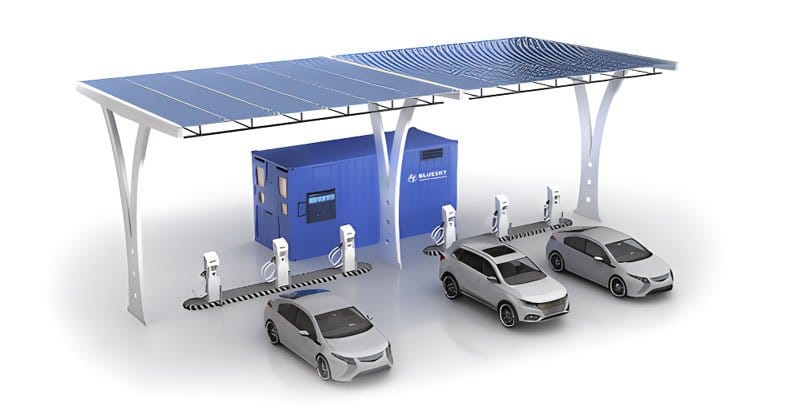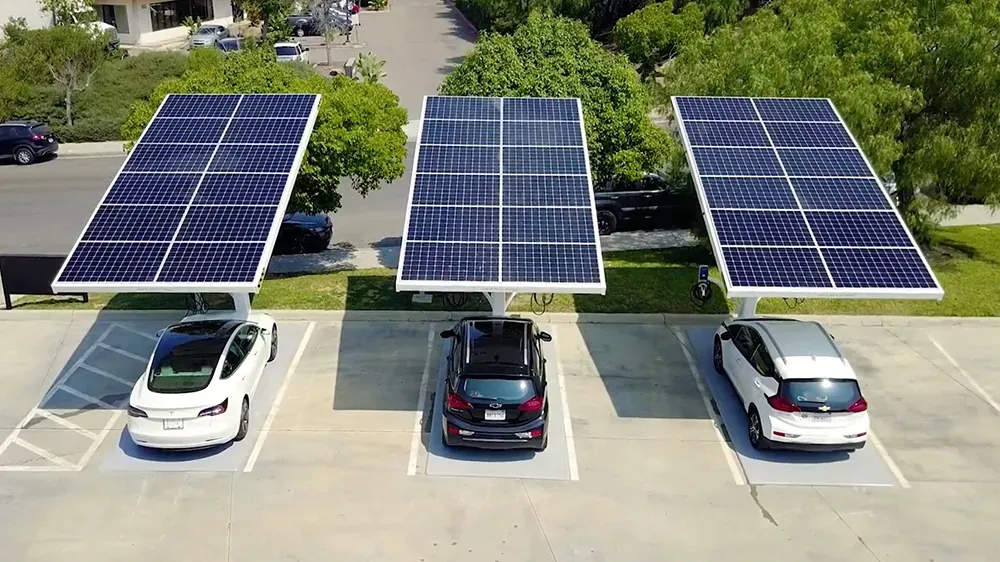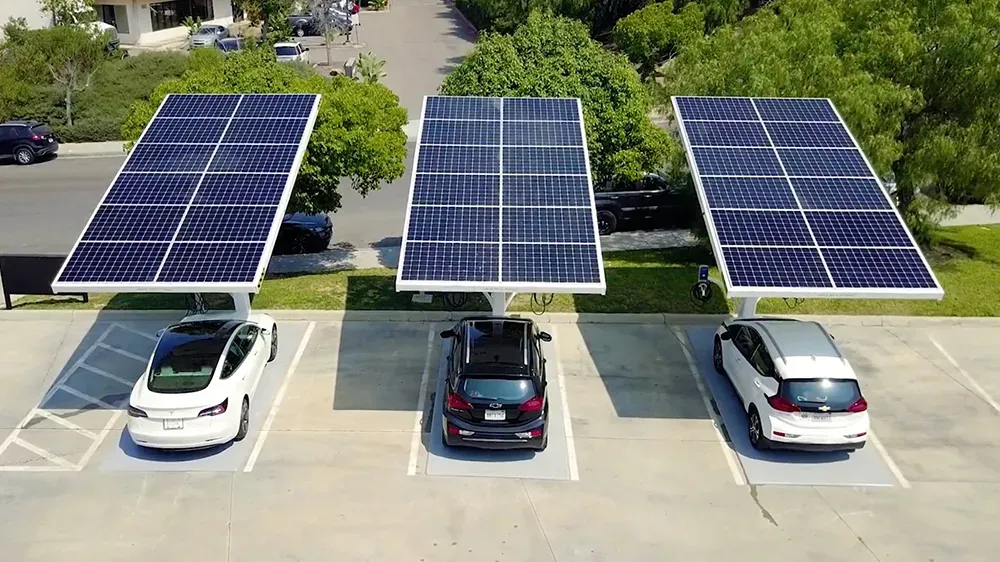Solar-Powered Charging Stations for Electric Vehicles.
The global movement towards sustainable energy solutions has reached the transportation sector, where electric vehicles (EVs) are leading.


The global movement towards sustainable energy solutions has reached the transportation sector, where electric vehicles (EVs) are leading.
However, as the EV market expands, the demand for clean, efficient, and accessible charging solutions is critical.
Solar-powered charging stations for EVs are emerging as an innovative, eco-friendly solution, providing a viable alternative to grid-powered stations and maximizing the environmental benefits of driving electric.
This article explores the role of solar-powered EV charging stations and the advantages of using solar energy over conventional electricity.

1. Solar-Powered Charging Stations: How They Work
Solar-powered EV charging stations operate by harnessing sunlight through photovoltaic (PV) panels installed on canopies or ground-mounted structures.
These PV panels convert sunlight directly into electricity, which can then be used to charge EVs. The setup generally involves:
- Solar Panels: PV panels capture sunlight and generate DC electricity.
- Battery Storage: Many solar charging stations include battery systems to store energy for times when sunlight is not available (e.g., night or cloudy days).
- Inverter: This device converts the DC electricity from the solar panels into AC electricity, which most EVs require for charging.
- Charging Points: The stations provide charging points where EVs can plug in and charge, either in public spaces, workplaces, or homes.
Solar charging stations can be either on-grid or off-grid. On-grid stations feed surplus solar energy back to the electricity grid, which can be drawn from if additional power is needed.
Off-grid stations, on the other hand, rely solely on solar and stored battery power, making them ideal for remote areas or locations with limited grid access.
2. The Importance of Solar over Conventional Electricity for EV Charging
a) Environmental Benefits
One of the primary motivations behind EV adoption is to reduce greenhouse gas emissions and combat climate change.
However, when EVs are charged using grid electricity, particularly in regions where fossil fuels are the primary energy source, the environmental benefits are diluted.
Charging with solar energy significantly enhances EVs’ green impact by ensuring that the energy powering them is also carbon-free.
Key Environmental Advantages:
- Zero Emissions: Solar energy is clean and renewable, producing no greenhouse gases or pollutants during electricity generation.
- Reduced Fossil Fuel Dependence: By utilizing solar power, EV charging reduces the reliance on coal, oil, and natural gas, aligning with global goals to decrease carbon footprints.
- Lower Resource Depletion: Solar energy helps conserve natural resources, as sunlight is an abundant and renewable resource compared to finite fossil fuels.
b) Cost-Effectiveness
While the upfront cost of installing solar panels and setting up a solar charging station can be high, the long-term savings are considerable.
Solar energy is essentially free after the initial installation, and solar panels typically require minimal maintenance over their 25+ year lifespan.
Additionally, as solar technology continues to advance, costs are decreasing, making it a more feasible option for a wide range of settings.
Economic Advantages Include:
- Lower Operational Costs: Solar stations do not incur the ongoing electricity costs that grid-powered stations do.
- Energy Independence: Solar charging allows for greater energy autonomy, particularly important for businesses, municipalities, and households in areas with high electricity costs.
- Return on Investment: Solar installations can eventually pay for themselves through savings on electricity bills, especially with government incentives for renewable energy.
c) Infrastructure for Rural and Remote Areas
In rural and remote areas, access to reliable electricity can be limited. Extending power grids to these locations is often costly and logistically challenging.
Solar-powered charging stations are an ideal solution for providing EV infrastructure in areas lacking robust electricity access, as they can operate independently from the grid.
This means that solar-powered stations are not only environmentally beneficial but also practical for widespread EV adoption in hard-to-reach locations.
Advantages for Rural Infrastructure:
- Energy Access: Solar charging stations allow rural areas to support EVs without needing grid extensions.
- Job Creation: The installation and maintenance of solar stations can create local jobs, boosting economic development.
- Empowering Sustainable Development: Solar-powered EV infrastructure contributes to sustainability in rural areas by offering cleaner transportation options and reducing reliance on imported fuels.
d) Reliability and Energy Security
Grid-powered EV charging is susceptible to power outages, particularly in countries where electricity infrastructure may be unstable.
Solar-powered stations, particularly those equipped with battery storage, can continue operating during grid failures, providing a reliable charging solution.
Solar stations also help to reduce stress on power grids, especially in areas where the grid is already stretched.
Reliability Benefits Include:
- Power Availability: Solar stations with battery storage can operate continuously, even during blackouts.
- Stabilized Energy Demand: By reducing the load on the power grid, solar charging stations help prevent overloading and contribute to grid stability.
- Resilience in Emergencies: Solar stations are invaluable during emergencies or natural disasters when the grid may be down, ensuring that critical transport and services can keep running.
e) Future-Proofing Transportation Infrastructure
As EV adoption rises, cities and countries need to expand their charging infrastructure rapidly.
Solar-powered charging stations offer a scalable and sustainable solution.
Many cities are already integrating solar chargers in public spaces, airports, and shopping centers, paving the way for a robust, renewable-powered EV charging network.
Benefits for Future Infrastructure Planning:
- Scalable Technology: Solar systems can be scaled up or down based on charging demand, making them suitable for everything from home chargers to large public stations.
- Preparation for Energy Transition: Transitioning to solar for EV charging aligns with long-term sustainability goals and prepares transportation networks for a renewable energy future.
- Enhanced Public Perception: Solar EV chargers underscore a city’s commitment to sustainability, helping to attract green-conscious consumers and businesses.

3. Case Studies: Solar-Powered EV Charging Success Stories
Morocco’s Solar-Powered Charging Initiative
Morocco, a leader in renewable energy in Africa, has begun using its massive solar potential to fuel EV charging stations.
Ouarzazate Solar Power Station, one of the world’s largest solar plants, is now powering EV chargers, reducing the country’s reliance on imported fuels and cutting emissions.
United States: Envision Solar’s Solar Tree® EV Charging Stations
In the U.S., Envision Solar has developed Solar Tree® stations, which use solar canopies to provide off-grid EV charging.
These stations are popular for corporate campuses, city infrastructure, and public parks, where they generate clean electricity without requiring significant infrastructure changes.
Kenya’s Solar-Powered EV Chargers
With a significant portion of Kenya’s power grid supplied by renewable energy sources, companies are now investing in solar-powered EV chargers for Nairobi’s growing EV market.
This effort helps offset the demand on the national grid while providing sustainable charging for the city’s electric buses and private vehicles.

Conclusion: The Road to a Solar-Powered Future
Solar-powered EV charging stations represent a crucial step forward in the pursuit of sustainable and accessible transportation.
By tapping into the sun's abundant energy, these stations reduce emissions, offer cost savings, and provide a reliable charging option that’s particularly valuable in remote and rural areas.
As the EV market expands globally, the demand for clean charging options will continue to rise, making solar power an increasingly important player in the future of green transportation.
Investing in solar-powered EV charging not only helps meet environmental goals but also builds the infrastructure necessary for a greener, more resilient future.
As more governments, businesses, and individuals embrace the potential of solar energy, the dream of a truly clean transportation system powered by the sun becomes increasingly achievable.




